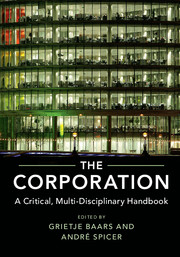Book contents
- Frontmatter
- Contents
- List of Contributors
- Acknowledgements
- Introduction: Why the Corporation?
- PART I DISCIPLINARY OVERVIEWS
- PART II INTERDISCIPLINARY THEMATIC CHAPTERS
- 1 The Evolution of the Corporate Form
- a Between Company and State: The Dutch East and West India Companies as Brokers between War and Profit
- b Early Modern Business Projects and a Forgotten History of Corporate Social Responsibility
- c Finance and the Origins of Modern Company Law
- 2 The Multinational Corporate Group
- 3 The Financialization of the Corporation
- 4 Corporate Value Chains
- 5 Corporate Citizenship
- 6 The Corporation and Crime
- 7 The Corporation and Ideology
- 8 Corporation and Communities
- 9 Corporations and Resistance
- 10 Alternatives to the Corporation
- Index
- References
c - Finance and the Origins of Modern Company Law
from 1 - The Evolution of the Corporate Form
Published online by Cambridge University Press: 31 March 2017
- Frontmatter
- Contents
- List of Contributors
- Acknowledgements
- Introduction: Why the Corporation?
- PART I DISCIPLINARY OVERVIEWS
- PART II INTERDISCIPLINARY THEMATIC CHAPTERS
- 1 The Evolution of the Corporate Form
- a Between Company and State: The Dutch East and West India Companies as Brokers between War and Profit
- b Early Modern Business Projects and a Forgotten History of Corporate Social Responsibility
- c Finance and the Origins of Modern Company Law
- 2 The Multinational Corporate Group
- 3 The Financialization of the Corporation
- 4 Corporate Value Chains
- 5 Corporate Citizenship
- 6 The Corporation and Crime
- 7 The Corporation and Ideology
- 8 Corporation and Communities
- 9 Corporations and Resistance
- 10 Alternatives to the Corporation
- Index
- References
Summary
Of all the branches of law, company law is perhaps the one least readily understood except in relation to its historical development.
L. C. B. Gower in Principles of Modern Company Law (Gower and Davies, 1997: 18)Company Law and the Joint stock Company
There has long been a tendency to regard the rise of the business corporation as a phenomenon in little need of explanation. As early as the 1930s, one scholar was describing it as ‘the story of an economic necessity forcing its way slowly and painfully to legal recognition’ (Hunt, 1936: 13), and another was arguing that until British law made the corporate privileges freely available in the mid-nineteenth century ‘full economic development was impossible’ (Shannon, 1931: 12). More recently, but in a similar vein, a group of prominent legal scholars have described the ‘common structure’ and ‘underlying uniformity’ of the corporate legal form as ‘induced by the economic exigencies of the large modern business enterprise’, before going on to suggest that so indispensable are its key features – separate legal personality, limited liability, transferable shares, delegated management and shareholder primacy – that ‘corporate law everywhere must, of necessity, provide for them’ (Kraakman et al., 2004: 1215). The suggestion is that the rise to dominance of the corporate legal form in its current form was essentially economically determined, the product of technological advances and the efficiency-enhancing imperatives of market forces. This belief underlay recent claims that we had reached ‘the end of history for corporate law’ and that corporate law around the world is converging on a standard shareholder-oriented model of the corporation (Hansmann and Kraakman, 2001). The effect of this story of economic inevitability and ‘evolution to efficiency’ is, of course, to naturalize and de-politicize the corporate legal form as currently constituted, immunizing it from serious critical examination and evaluation. This chapter argues that, contrary to this account, history shows that far from being a product of (more or less) inexorable economic forces, the corporate legal form, as developed for businesses, was, in the specific form we know it, a political construct, developed in large part to accommodate and protect the interests of rentier investors.
- Type
- Chapter
- Information
- The CorporationA Critical, Multi-Disciplinary Handbook, pp. 238 - 246Publisher: Cambridge University PressPrint publication year: 2017
References
- 10
- Cited by



